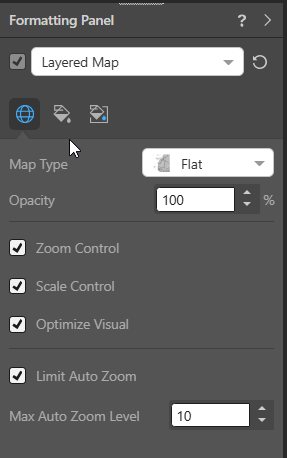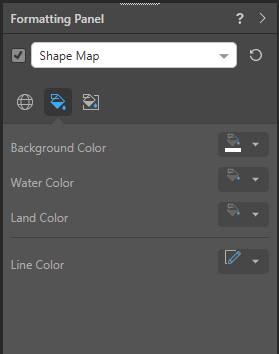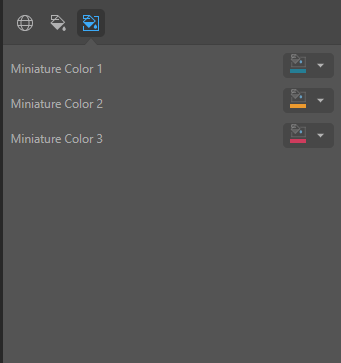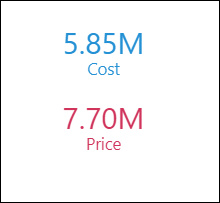Layered maps are a combination of a Bubble and Shape map, with data points displayed as bubbles and map data in polygons. Bubbles used to represent values and shapes visualize a given measure across countries, states, or counties.
When working with layered maps, several formatting options are afforded that enable you to design the map according your needs. For instance, you can select the specific map type, customize the map colors, add zoom control buttons, and more.
Layered Map Chart Formatting
Settings
Click Settings to set the map type, shape opacity, and enable the map controls:

Map Type
Choose your required "map type." The map type indicates how the map itself should be drawn; for example, should it be a street view or a topology map. For more information, see Map Quick Styles.
Opacity
Change the "opacity" (as opposed to the transparency or "see-throughness") of the shapes on your map. Remember: 100% is completely solid and not see-through at all; dropping the opacity from 100% makes the shape increasingly transparent which allows you to see, say, the topology of the map through the shapes. For more information, see Opacity.
Map Controls
- Zoom Control: Add zoom controls to the map.
- Scale Control: Show or hide the scale control.
- Optimize Visual: The visual optimization engine in Pyramid is a heuristic that automatically redacts certain parts of a graphical visualization based on the amount of space provided.
Auto Zoom Controls
By default, Pyramid will zoom to the map at the highest level of detail. Where an individual point is selected in the query, for example an individual building or an address, this may result in such a high level of zoom that the context of point on the map is lost. Limiting the level of zoom allows the user to define the level of detail shown, keeping the map point in visual context.
- Limit Auto Zoom: Enables the Auto Zoom Limit, limiting the degree of map zoom when individual or groups of data points are selected (Max Auto Zoom Level).
- Max Auto Zoom Level: Sets the Limit level from 0 (lowest zoom level) to 20 (highest zoom level).
Fill
Click Fill to change the colors used for your visual background and map:

You can use the Color Picker to specify the different colors to use for your map:
- Background Color: Change the color of the map background.
- Water Color: Change the color of the water wherever it is shown on the map (lakes, rivers, sea, and so on).
- Land Color: Change the color of the land.
Note: Water and Land Color fill options are not relevant to Satellite Map Types.
For Shape Maps and Layered Maps only:
- Line Color: Change the color of the land outlines.
Miniature
Click Miniature (purple arrow below) to specify the colors used for the text content when your visual is represented as a Miniature Visual:

Miniature visuals are created automatically when you scale a visual down to a size that makes its content illegible. These tiles typically display the measure as a number with its name underneath:

Note: The purpose of a miniature visual is to provide a way to easily view and interpret important data at a glance, even where there is a lot of information and limited space.
You can use the Color Picker to set the text colors used when Miniatures are displayed in a visual:
- Miniature Color 1: Select the color for the first tile in the miniature visual (blue in the preceding example).
- Miniature Color 2: Select the color for the second tile in the miniature visual (red in the preceding example).
- Miniature Color 3: Select the color for the third tile in the miniature visual (not shown).